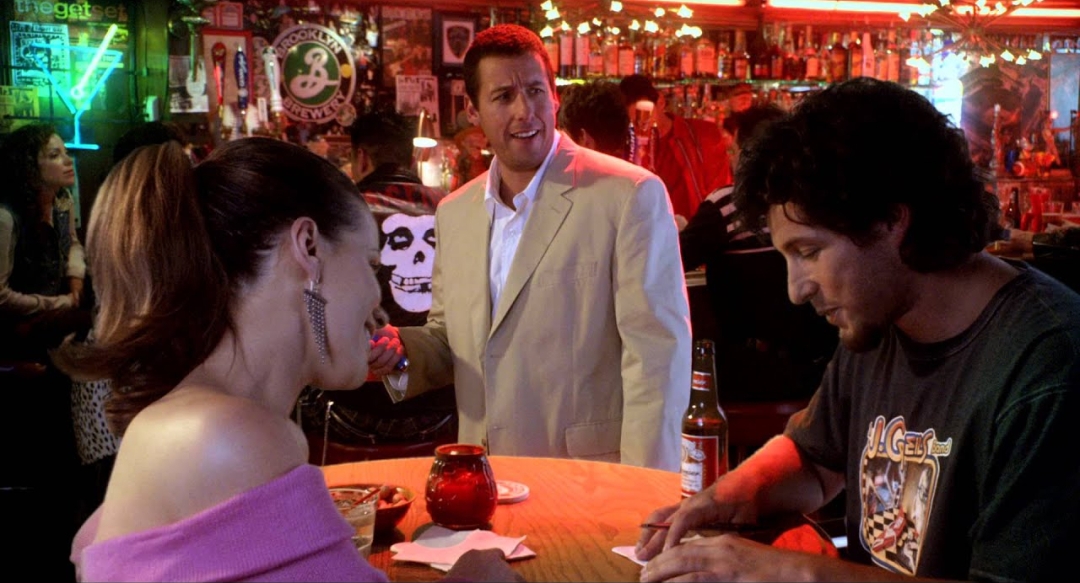Happy Madison Productions – the production company founded by Adam Sandler in 1999 – has been so prolific, so successful and produced work so instantly recognisable that its films practically constitute a genre of their own. The company is named for the two films that essentially form the blueprint for their core formula, Billy Madison and Happy Gilmore, and most of their films are just variations on their basic gimmick: a pathetic man goes through a series of humiliations and learns a lesson about himself.
It’s a story that can be told more or less sincerely, with genuine heart (Happy Gilmore) or none at all (Billy Madison), as a rags to riches tale (Mr. Deeds), a buddy comedy (I Now Pronounce You Chuck & Larry), a rom-com (50 First Dates) or a sci-fi action movie (Pixels), but always with that same central character arc and Happy Madison’s trademark broad, vulgar, puerile sense of humour. The most famous and successful usually star Sandler himself, but they’ve produced vehicles for other members of his posse, from the comparatively successful David Spade (Joe Dirt) and Kevin James (Paul Blart) to bit players like Allen Covert (Grandma’s Boy) and Nick Swardson (Bucky Larson). In recent years, they’ve begun to do more ensemble comedies (Grown Ups, Pixels, The Ridiculous 6) and dual-lead films (The Do-Over, The Week Of, Father of the Year) with multiple pathetic men, and they’ve produced films outside that mould altogether (Reign Over Me, Funny People, The Shortcut), but the formula of their core product hasn’t really changed in over twenty years. That is the Happy Madison film.
Click is the sixteenth film released by Happy Madison. It’s about a guy who gets a TV remote that controls reality. The first thing he does when he realises that he can manipulate the flow of time is fast-forward his pooping dog. Click is also the first film I ever cried at. I’d certainly had intense emotional reactions to movies before, like when a teacher in my primary school showed us Agnieszka Holland’s 1993 adaptation of The Secret Garden and I realised for the first time that my parents would die one day. I remember films before Click that got me choked up or made tears well in my eyes. But the first film I cried at – sobbed at, really – was Click. I’ve revisited it every couple of years since I saw it as a child, and every couple of years, I still like it. Sometimes more than the last time, sometimes less. Sometimes exactly how I remember it, sometimes as if I’m watching it for the first time. It’s not the best movie Adam Sandler has ever done (Punch-Drunk Love) or his best performance (Uncut Gems) or the best film ever produced by Happy Madison (Funny People). But it is a great film, one I’ve loved for most of my life and expect I will always love in the simple, uncomplicated way we love the movies that made us.
If you know anything about Happy Madison, you know their films are considered lowbrow trash, and not particularly unfairly. I’ve called the entire existence of Happy Madison a scam before, and I’m happy to do so again now, because it is. But just as Vox publishes a lot of great cultural writing while pretending to be a journalistic outlet, Happy Madison has produced good films. There’s a temptation in defending single works of a largely reviled kind to try and distance the particular from the general, to say “I know this is technically one of those, but it’s not really one of those”. That’s not necessarily a dishonest move: Reign Over Me, a drama about a mentally-ill 9/11 widower starring Sandler and produced by Happy Madison, is very much not a Happy Madison film in the sense I described above. But it’s too often less about clarity than not admitting you like something disreputable. I love Click, but I would never claim, as I have with Reign Over Me or Funny People, that it “isn’t really a ‘Happy Madison’ film”. Of course it’s a Happy Madison film. It’s the most Happy Madison film ever made. It’s the vindication of the Happy Madison film as a genre.
Continue reading “Will You Still Love Me in the Morning?” →










